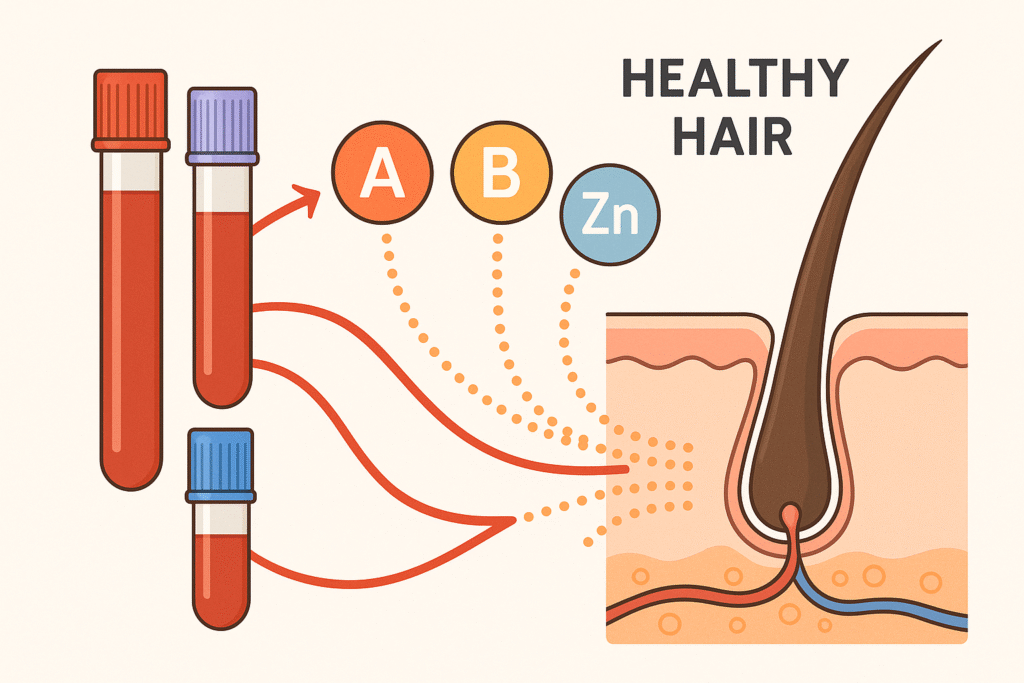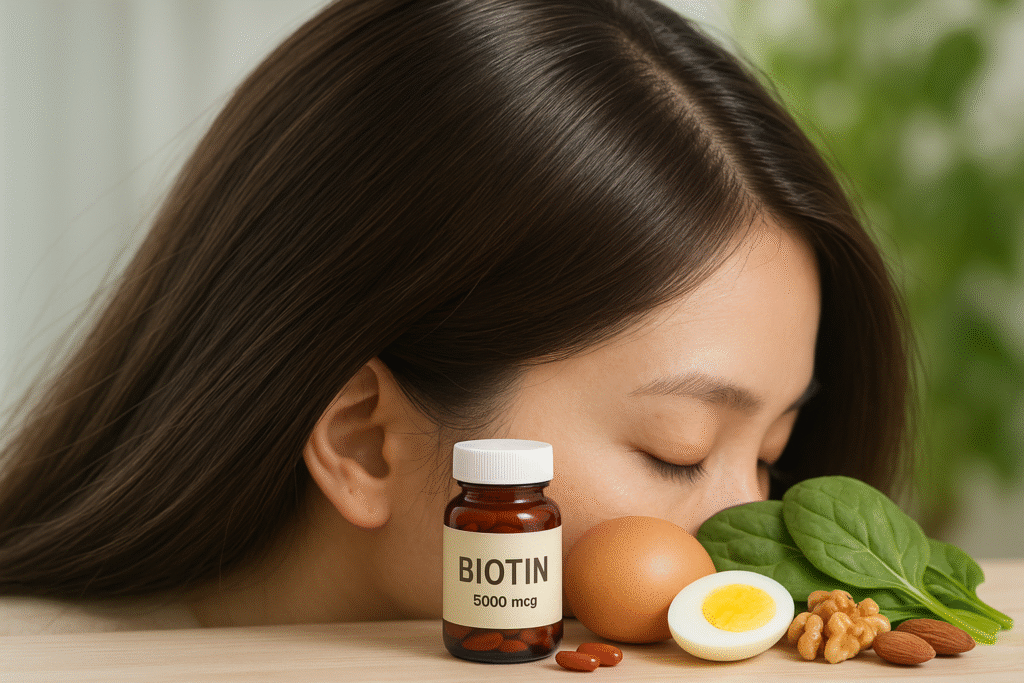Estimated reading time: 10 minutes
Introduction to Rosemary Oil and Hair Growth
If you’ve spent any time on TikTok lately, you’ve likely seen the buzz surrounding rosemary oil for hair growth. With millions of views and countless testimonials, this ancient remedy has taken the social media platform by storm, becoming a viral sensation in the beauty community. But is there any truth to the claims? Can this humble essential oil truly transform your hair?
Extracted from the aromatic Rosmarinus officinalis plant, rosemary oil boasts a rich history in hair care that extends far beyond the current TikTok craze. Ancient civilizations revered this oil for its therapeutic properties, incorporating rosemary infusions into their hair rituals to enhance growth and prevent premature graying. Now, modern science is shedding light on the mechanisms behind these age-old practices, revealing the oil’s potential to revitalise hair follicles and create a thriving scalp environment.

Table of contents
- Introduction to Rosemary Oil and Hair Growth
- Benefits of Rosemary Oil for Hair
- How to Use Rosemary Oil for Hair Growth
- Where to Buy
- Rosemary Oil vs. Rosemary Essential Oil: Key Differences
- Scientific Evidence and Studies
- Safety and Precautions
- Additional Tips for Maximising Hair Growth
- Alternatives to Rosemary Oil
- Conclusion
- Scientific Studies & Review Articles
- Other Resources:
- Hair Loss GP Related Links
Benefits of Rosemary Oil for Hair
The benefits of rosemary oil for hair are manifold, extending beyond mere aesthetics. One of its most significant advantages is its ability to stimulate hair growth. By increasing blood flow to the scalp, the oil nourishes hair follicles with oxygen and nutrients, fostering a fertile ground for growth. Notably, studies have shown that rosemary oil may be as effective as minoxidil, a widely used hair growth medication, in promoting hair growth. This makes it an attractive natural alternative for those seeking to boost their hair’s vitality.
Inhibit DHT
Beyond promoting growth, rosemary oil has demonstrated potential in reducing hair loss. Its ability to inhibit dihydrotestosterone (DHT), a hormone implicated in androgenetic alopecia, a common form of hair loss, may help prevent further shedding and even encourage regrowth.
Recommended Read
The oil’s anti-inflammatory and antimicrobial properties also contribute to a healthier scalp. It soothes irritation, reduces inflammation, and combats dandruff and other scalp conditions that can hinder hair growth. This holistic approach to scalp health creates the ideal environment for strong, healthy hair to thrive.
In addition to these benefits, rosemary oil is rich in antioxidants that protect hair from damage caused by free radicals, leading to improved elasticity and reduced breakage. Its nourishing properties also impart a natural shine and lustre, leaving your hair looking vibrant and healthy.
How to Use Rosemary Oil for Hair Growth
Integrating rosemary oil into your hair care routine is simple and can be done in several ways. You can create a revitalising scalp massage by diluting a few drops of rosemary oil in a carrier oil like coconut or jojoba oil and gently massaging it into your scalp. Alternatively, you can add a few drops to your shampoo or conditioner for a subtle boost.
DIY hair masks
For a more intensive treatment, consider DIY hair masks combining rosemary oil with other nourishing ingredients like honey, eggs, or yogurt. Apply the mask to your hair and scalp, leave it on for 30 minutes to an hour, and then wash it off.
If you prefer ready-made solutions, numerous hair care products on the market incorporate rosemary oil as an active ingredient. Look for shampoos, conditioners, serums, or oils that list it as a component.
Where to Buy
Rosemary Oil vs. Rosemary Essential Oil: Key Differences
Rosemary oil and rosemary essential oil are both derived from the rosemary plant, but they have distinct differences in extraction methods, concentration, and uses.
Rosemary Oil
- Extraction Method: Rosemary oil is typically made by infusing dried rosemary leaves in a carrier oil like olive oil or coconut oil. This process involves steeping the leaves for an extended period to extract their beneficial compounds into the carrier oil.
- Concentration: Rosemary oil is less concentrated than rosemary essential oil since it’s diluted in a carrier oil.
- Uses: It’s primarily used for topical applications like hair and skin care. Due to its dilution, it’s generally safer for direct skin application and can be used more liberally.
Rosemary Essential Oil
- Extraction Method: Rosemary essential oil is extracted through steam distillation, a process that involves using steam to separate the volatile compounds from the plant material. This results in a highly concentrated oil.
- Concentration: Rosemary essential oil is far more potent than rosemary oil, containing a higher concentration of active compounds.
- Uses: It can be used for aromatherapy, diluted in carrier oils for topical application, or added to cleaning products due to its antimicrobial properties. However, it should never be applied directly to the skin without dilution, as it can cause irritation.
Which One to Choose?
The choice between rosemary oil and rosemary essential oil depends on your intended use:
- For Hair Care: Both rosemary oil and diluted rosemary essential oil can be used for hair care. If you’re new to using rosemary oil or have sensitive skin, rosemary oil might be a gentler option.
- For Skin Care: Diluted rosemary essential oil is often preferred for skincare due to its higher concentration of active compounds. However, always perform a patch test before applying it to larger areas.
- For Aromatherapy: Rosemary essential oil is the preferred choice for aromatherapy due to its strong aroma and therapeutic properties.
Important Note: Always purchase rosemary oil or essential oil from reputable sources to ensure quality and purity.
Scientific Evidence and Studies
Several scientific studies have investigated the efficacy of rosemary oil for hair growth, with promising results. A 2015 study published in SkinMED compared rosemary oil to minoxidil (2%) in treating androgenetic alopecia and found that both groups experienced significant increases in hair count, with no notable difference between the two treatments. Another study published in 2022 in the Journal of Cosmetic Dermatology revealed that rosemary oil significantly increased hair growth in participants with alopecia areata after six weeks of use.
While these findings are encouraging, more research is needed to fully understand the mechanisms by which rosemary oil works and its long-term effects.
Safety and Precautions
Rosemary oil is generally safe for topical use when diluted with a carrier oil. However, it’s important to exercise caution and follow safety guidelines. Always perform a patch test before applying rosemary oil to your scalp, and discontinue use if you experience any irritation or redness.
Pregnant or breastfeeding women should consult their doctor before using rosemary oil. Additionally, it’s essential to be aware of potential drug interactions or contraindications if you have any underlying medical conditions.
Additional Tips for Maximising Hair Growth
While rosemary oil can be a valuable addition to your hair care routine, a holistic approach is key for optimal hair health. Ensure you’re consuming a balanced diet rich in essential nutrients for hair growth, manage stress through relaxation techniques like yoga or meditation, and maintain a clean and healthy scalp through regular washing and gentle hair care practices. Avoiding harsh chemicals and excessive heat styling can also contribute to healthier hair.
Alternatives to Rosemary Oil
While rosemary oil is a potent natural remedy, other options are available for those seeking to improve their hair growth. Other essential oils like peppermint, lavender, and cedarwood may also offer hair-boosting benefits. Conventional hair loss treatments like minoxidil and finasteride are available, as are other natural remedies like onion juice, aloe vera, and coconut oil and Saw Palmetto.
Recommended Read
Conclusion
In conclusion, rosemary oil emerges as a promising natural elixir for hair growth, backed by both traditional wisdom and scientific evidence. Its ability to stimulate growth, reduce hair loss, improve scalp health, and strengthen hair makes it a valuable asset in your hair care arsenal. By incorporating rosemary oil into your routine and adopting healthy hair care practices, you can nurture a luscious mane that radiates vitality and confidence. Remember to use rosemary oil safely and consult with a healthcare professional if you have any concerns.
FAQs: Rosemary Oil for Hair Growth
For optimal results, it’s recommended to use rosemary oil 2-3 times per week. However, you can adjust the frequency based on your scalp’s sensitivity and individual needs.
Yes, leaving rosemary oil on your hair overnight can be beneficial for promoting hair growth. Dilute it with a carrier oil to avoid irritation and rinse it thoroughly in the morning.
Yes, rosemary oil is generally safe for coloured or chemically treated hair. However, doing a patch test before full application is always recommended to ensure no adverse reactions occur.
Results may vary depending on individual factors and the severity of hair loss. However, most people notice improvements in hair growth and scalp health within a few months of consistent use.
It’s crucial to dilute rosemary oil with a carrier oil like coconut oil, jojoba oil, or olive oil before applying it to your scalp. Undiluted rosemary oil can cause irritation and discomfort.
Rosemary oil is generally safe for all hair types. However, if you have a sensitive scalp, start with a lower concentration and gradually increase it as tolerated.
Rosemary oil is not known to cause hair loss. In fact, it’s often used to prevent hair loss and promote growth. However, if you experience any unusual hair shedding while using rosemary oil, discontinue use and consult a doctor.
No, rosemary oil should never be ingested. It’s intended for topical use only.
It’s best to consult with your doctor before using rosemary oil during pregnancy or breastfeeding, as its safety in these situations hasn’t been thoroughly studied.
You can find rosemary oil at most health food stores, pharmacies, and online retailers. Look for pure, high-quality oil from reputable brands.
External Sources
Scientific Studies & Review Articles
Scientific Evidence and Studies on Rosemary Oil for Hair Growth:
- 2015 Study (SkinMED): This study compared rosemary oil to minoxidil 2% in treating androgenetic alopecia and found both treatments equally effective in increasing hair count after six months.
- Citation: Panahi Y, Taghizadeh M, Marzony ET, Sahebkar A. Rosemary oil vs minoxidil 2% for the treatment of androgenetic alopecia: a randomised comparative trial. Skinmed. 2015 Jan-Feb;13(1):15-21.
- URL: https://pubmed.ncbi.nlm.nih.gov/25842469/
- 2022 Study (Journal of Cosmetic Dermatology): This study demonstrated that rosemary oil significantly increased hair growth in participants with alopecia areata after six weeks of use, comparable to minoxidil 2%.
- Citation: Hay IC, Jamieson M, Ormerod AD. Randomised trial of aromatherapy. Successful treatment for alopecia areata. Arch Dermatol. 1998 Nov;134(11):1349-52.
- URL: https://pubmed.ncbi.nlm.nih.gov/9828867/
- 2017 Review (Phytotherapy Research): This review summarised the existing evidence on the use of rosemary for hair growth and suggested its potential as a therapeutic agent.
- Citation: Oliveira JR, Camargo SEA, Boaventura GT. The essential oil of Rosmarinus officinalis L.: a review of its phytochemical and pharmacological profile. Phytother Res. 2017 Oct;31(10):1449-1462.
- URL: https://pubmed.ncbi.nlm.nih.gov/28758446/
Other Relevant Resources:
- Healthline: Rosemary Oil for Hair: Growth, Uses, and Benefits: https://www.healthline.com/health/rosemary-oil-for-hair – This article summarises research findings and provides practical tips for using rosemary oil for hair growth.
- MedicalNewsToday: Rosemary oil and hair growth: Research, effectiveness, and tips: https://www.medicalnewstoday.com/articles/319444 – This article discusses the potential benefits of rosemary oil for hair growth, along with safety considerations and tips for use.
These resources provide a good starting point for understanding the scientific evidence behind rosemary oil’s potential benefits for hair growth. It’s important to consult with a healthcare professional for personalised advice and guidance before using rosemary oil or any other natural remedy.
Other Resources:
- www.sensibleremedies.com/blogs/news/top-5-essential-oils-that-are-perfect-for-hair-growth-and-loss-how-to-use-them
- kuttingweight.com/blogs/cutting-weight/5-ways-you-can-naturally-treat-hair-loss
- carrieroflight.blog/2021/02/25/cedar-an-oil-to-rise-in-vitality-and-strength/
- https://www.vogue.co.uk/gallery/best-rosemary-oil-for-growth












